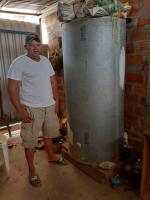Eco-Coffee
Ok, those that know me realize that while I revere and love the natural world something about the “fuzzy green” movement irks me on a fundamental level. Maybe its the colossal naivety or a counter reactionary swing in the face of any overly radical stance, but its there. Regardless, I think we can all agree that anything that contributes to the environment AND helps coffee can’t be all bad. Thank you, Twelveoaks (and the Atlanta Audubon Society), for bringing this article to my attention.
Shade vs. Sun?The Facts:
Shade-Grown Coffee
- Migratory birds and many resident birds find sanctuary in the forest canopy of traditional coffee plantations.
- Shade trees protect the plants from rain and sun, help maintain soil quality, and aid in natural pest control, thanks to the birds.
- Traditional coffee plantations help to conserve watersheds, leading to higher water quality and quantity for local populations.
- Shade-grown coffee is cultivated in specific ways that help protect biodiversity.
- Shade coffee plants can produce crops of beans for up to 50 years.
Sun-Grown Coffee
- 90% fewer bird species are found in sun-grown coffee areas compared with shade-grown coffee areas.
- Requires chemical fertilizers and pesticides and year-round labor, placing financial demands on the growers.
- Leads to greater soil erosion and higher amounts of toxic runoff endangering both wildlife and people.
- Sun coffee plants produce crops of beans for only 10 to 15 years.
View a list of some of the migratory birds found in shade coffee farms.
What conservation-minded coffee consumers can do:If the demand for shade-grown, organic coffee continues to increase due to the efforts of Atlanta Audubon Society and other concerned groups, we will be helping many of the neotropical migratory birds survive to return and breed in our backyards. Here are some ways to help:
Many national retail chains such as Whole Foods, Caribou Coffee, and Wild Birds Unlimited now carry at least one brand of genuine SGC. Coffee beans bought locally through markets, health food and coffee shops marked “Mexican Organic” are likely grown under bird-friendly conditions. If your favorite shop has none of these, ask the management to look into marketing shade-grown and/or organic coffees. When buying these coffees locally, let them know why you made your choice ? it?s for the birds! In Atlanta, check our list of Local SGC Sources; in other areas, use it as a base to start your own local list.
An increasing number of coffee companies are specializing in high-quality organic coffees that are also shade grown and, therefore, come from good migratory bird habitats. When ordering coffee from these companies, send a message or talk with someone in charge about how important the conservation of tropical bird habitat is to your coffee-buying decision. Some of the notable companies marketing shade coffee are listed on our SGC Sources page.
Gather information about the coffee-migratory bird connection and spread the news to community groups, co-workers, customers, and the news media. (Recommendations and some materials are available from Atlanta Audubon or check our list of SGC Web Links.) Together we can greatly help protect migratory birds breeding in the U.S. and Canada, as well as many of the beautiful resident birds sharing these habitats with the migrants wintering in the tropics.
Buy our “Drink Shade-Grown Coffee for the Birds” t-shirt! When you wear it, you help to spread awareness of the connection between coffee production and migratory bird habitat in Latin America. View the t-shirt. |
(Appeared originally on the Atlanta Audubon Society page)



















